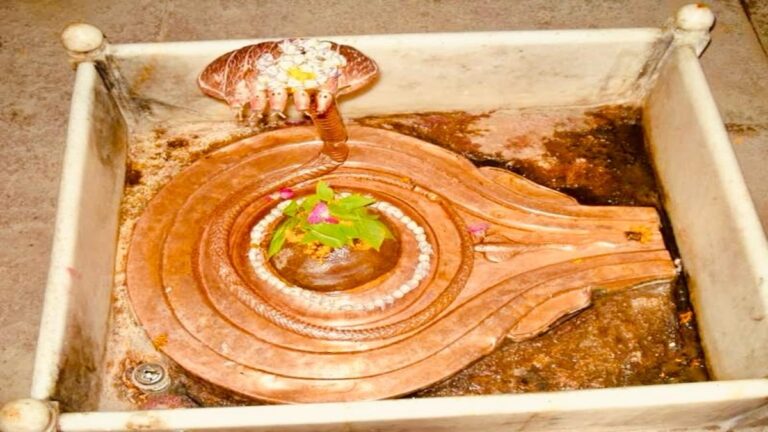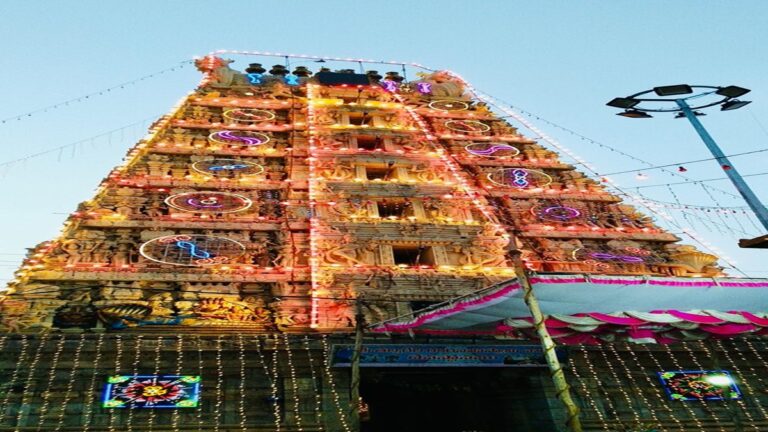Om Namah Shivaya!
Known as the “Kailasa of the South,” this temple is famous for its powerful spiritual vibe, especially as an important place for Rahu-Ketu puja. Being there felt like stepping into a different world, filled with reverence and calm even though there was chaos outside. This visit was a deeply soulful journey. Below I have tried to pen down all the information I could gather.
Introduction to Shri Kalahasti Temple
Legends have it that Shri Kalahasti Temple has been known as the ‘Kailasa of the South’ for over 2000 years now. River Swarna on the banks of which the temple is located, is also called the ‘Ganga of the South’. The temple Srikalahasti got its name when God Shiva appeared after Sri (a spider), Kala (a snake), and Hasti (an elephant) prayed to God Shiva, and he gave them Darshan.
It is said to be the same site where Kannappa a Shiv bhakt (worshipper) offered his eyes to God Shiva when he was testing Kannappa’s devotion. Shrikalahasti is considered one of the Pancha Bhoota (5 elements) Stahla (place) where the preceding deity, God Shiva, is worshipped in the form of Vayu (wind) Linga.
Another interesting fact about this Shri Kalahasti Temple is that this is the only temple in India that is open even during Solar and Lunar eclipses. The Rahu Ketu pooja performed here is famous and wards off the astrological impact it has on the person performing it.

Quick Information
| Nearest Airport | Tirupati Airport (TIR) |
| Distance from Airport | Approximately 24 Km |
| Travel Time from Tirupati Airport | Approximately 35 minutes |
| Travel Options from Tirupati Airport | Taxi from Airport or Bus service |
| Nearest Railway Station | Srikalahasti (Station code: KHT) – Approximately 2 Km |
| Travel Options | Taxi from railway station or Autorickshaw |
| Nearest Bus Station | Sri Kalahasti railway station |
| Temple Timings | 05:30 AM to 12:00 PM and 05:30 PM to 09:00 PM (Monday to Saturday) 05:30 AM to 12:00 PM and 05:30 PM to 09:30 PM (Sunday) |
History of Shri Kalahasti Temple
The history of Lord Shiva being present in Shri Kalahasti Temple in the form of Vayu Linga is related to Vayu Devta who performed Tapasya of Lord Shiva near Swarna Mukhi river. Vayu Devta worshipped the Karpoor Linga of Lord Shiva here.
Lord Shiva gave 3 boons to Vayu Devta. The first boon was that Vayu Devta would exist in the form of air in the whole creation process inside every living being and the second boon was that without him no living being would be able to survive. The third and final boon was that Karpoor Lingam would henceforth be worshiped as Vayu Lingam.
Legends have it that on this hill adjacent to the temple, Arjuna worshipped Lord Shiva and obtained Pashupati Astram. The Shivalinga established on top of the hill was established by Arjuna.
The history of this Vayu Lingam is also associated with devotees of Kannapa. Kannapa is believed to be an incarnation of the Arjuna in South India. Kannapa is said to have donated both his eyes to protect Linga. Once upon a time, Mahadev started to test the devotion of his devotee Kannapa. Once when Kannappa returned from the forest, he saw the blood flowing from the eyes of Lord Shiva on the Lingam. He remembered that by applying fresh human skin on a human wound, the wound heals quickly.
Without hesitating, he inserted the tip of the arrow took out one of his eyes put it on the idol’s eye, and suppressed it. The bleeding stopped from the eyes of the idol. Kannapa suddenly noticed that blood started flowing from the other eye of the idol. So, he kept his toe on that eye so that he could find that place even after being blinded when his other eye was removed. Just as he put the tip of the arrow in his other eye God Shiva appeared.
Apart from this, the other main temple within the temple premises is that of Lord Ganesha and Goddess Parvati. Goddess Parvati is known as Gnanaprasunambika here. Sri Kaalhasti Vayulingeshwar and along with it Gnanaprasunambika. After the darshan of the Lord, one should take the darshan of the Goddess, then Pataal Ganesh which is inside the temple. One must go downstairs; 5 people can have darshan at a time.
Deity At Shri Kalahasti Temple
The preceding deity is God Shiva, worshipped in the form of ‘Vayu’ Linga made with white stone facing west direction. However, the temple is facing south direction. Shri Parvati is worshipped here as Gnana Prasunambika Devi.
9 feet tall Vinayaka Pratistha can been visited which is below the ground level. Rare images of Vallaba Ganapathi, Mahalakshmi-Ganpathi, and Sahasra Lingeswara can also be seen within the temple premises. There are several other shrines in the Shri Kalahasti Temple including the shrines of Kasi Viswanatha, Annapurna, Suryanarayana, Sadyoganapathi and Subramanya.
Architecture At Shri Kalahasti Temple
The structure of the Shri Kalahasti Temple that you see today was built by Krishnadevaraya in 1516. The earlier main temple was built by the Pallava kings. The gopuram near the main gate is around 120 feet tall. Few inscriptions have revealed that the present structure is based on the Chola dynasty of the 10th century. Later, renovations were made by the following Chola Kings and Vijayanagar kings.
There are large hallways with several pillars having beautiful carvings of Hindu deities and scenes from Hindu Epics.
Offerings / Poojas at Shri Kalahasti Temple
There are abhishekam performed at the temple by the temple priests daily. Rudrabhishekam and Palabhishekam (Abhishekam using milk) are performed at the temple.
Rahu-Ketu Pooja:
Srikalahasti is famous for Rahu Ketu Pooja. People looking for remedies for bad aspects of Rahu-Ketu, visit Srikalahasti and perform the Rahu-Ketu pooja.
Kaala Sarpa Dosha Pooja:
Srikalahasti is also famous for Kaala Sarpa Dosha Pooja.
You also get Prasad in the temple premises itself. Prasad consists of a small desi ghee Ladoo worth Rs 15, tamarind rice which is called Pulihora here, and vadas.
Places to visit Nearby
Below are a few of the temples and nearby attractions.
- Tirupati Balaji Temple
- Bhakta Kannappa Temple
- Sahasralinga Temple
- Prasanna Varadaraja Temple
- Veyilingala Kona Waterfall
- Rural Handicrafts Centre




